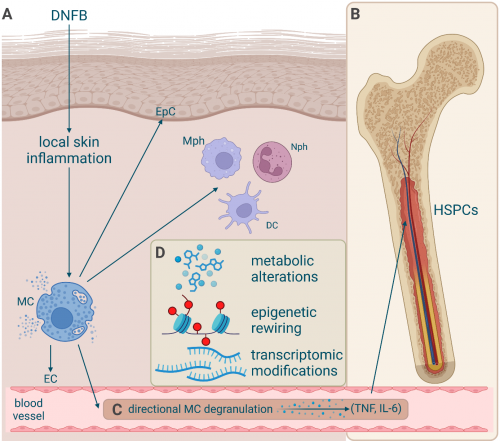MD12: Investigating the role of mast cells in central and peripheral trained immunity upon skin inflammation
|
|
Traditionally, it is believed that only the adaptive immune system exerts mechanisms of immune memory, which help respond to following infections with the same pathogen in an adapted and faster way. However, research of the last decade has shown, that the innate arm of immunity can adapt the response to infections as well – a concept that has been termed “trained immunity”. It is a process involving long-term epigenetic, transcriptomic, and metabolic adaptations in innate immune cells (i.e. peripheral trained immunity) or their progenitors (i.e. central trained immunity) to enhance subsequent immunity. However, the same mechanisms can also underlie maladaptive changes contributing to the progression of acute to chronic inflammation. Specifically, I will focus on allergic contact dermatitis (ACD), an inflammatory skin disease with a high socioeconomic burden. In ACD, hapten-induced stress responses in the epidermal barrier cause mast cell (MC) activation and degranulation, which in turn drive inflammation and itching, and thereby the vicious cycle towards chronic inflammation. We hypothesize that MCs play a crucial role in the induction of trained immunity. Therefore, we want to determine the relevance of MCs in central trained immunity in response to hapten, to investigate MC-driven effects on peripheral trained immunity, and to conduct mechanistic studies on the specific roles of MC-derived TNF and IL-6 in trained immunity. By elucidating the impact of skin MCs on trained immunity, this study contributes to the identification of novel targets for therapeutic intervention in skin diseases. Furthermore, it enhances our understanding of the development of these diseases, advancing the field towards more precise and effective therapeutic strategies.
(Created with biorender.com) |
Photos: by UMMD, Melitta Schubert/Sarah Kossmann








